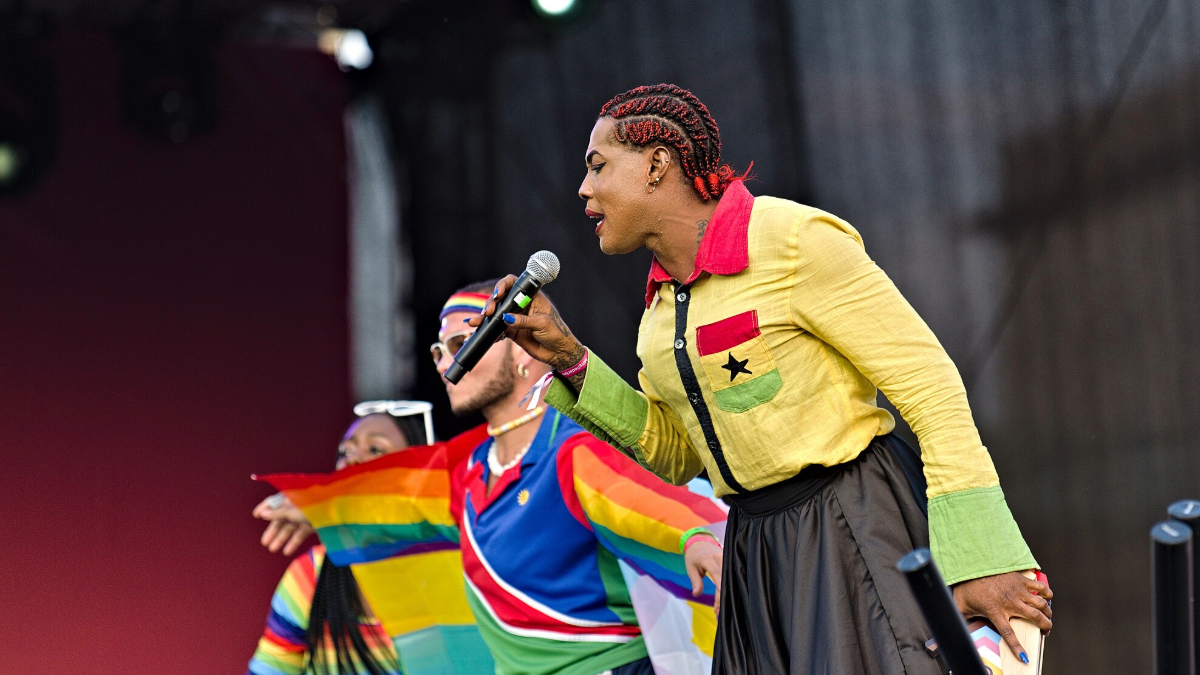Ghana’s Anti-LGBTQ+ Agenda Will Be A Disaster For Human Rights — Online And Off
Jaimee Kokonya / Dec 21, 2023
Ghanaian musician Angel Maxine performing in Berlin, July 2023. Leonhard Lenz/Wikimedia
In August last year, the director of the human rights organization Rightify Ghana was held hostage by seven men in Ghana’s Ashanti region. He was reportedly lured to a site to investigate abuse against a gay man, then attacked by a “notorious and violent anti-gay group.” This targeted assault took place before the right to be LGBTQ+ was up for debate in Ghana. Today, the hate and intolerance is growing — online and off — but there’s still time to turn the tide.
On 8 December, lawmakers in Ghana began deliberating on amendments to the Promotion of Proper Human Sexual Rights and Family Values Bill, 2021. Activists continue to warn that the legislation, which seeks to criminalize the very existence of LGBTQ+ people in Ghana, has triggered a nightmare of repression and dehumanization online, with dangerous real-world consequences.
Threatening human rights online
In the digital space, the new bill will expand the criminalization of LGBTQ+ people by restricting rights to privacy, access to information, and freedom of expression. A provision within the law will make it an offense to post content that could be interpreted as “promoting a change in opinion or sympathy” towards acts that it prohibits. Violations may lead to a person being imprisoned for up to ten years. For instance, a post on X, formally Twitter, by Rightify Ghana stating that “pedophilia should not be confused with homosexuality” could be criminalized, because it debunks the bill’s propaganda which falsely conflates LGBTQ+ people with groomers and predators.
The bill will also put trans and gender non-conforming people at risk of arrest for speaking about their gender identity or creating other content online. Angel Maxine, a trans Ghanaian musician, included a warning in the music video of her 2021 song Wo Fie, stating that “you may soon be arrested for watching or sharing this video.” The fear of this impending threat is not unfounded, and people in Ghana have witnessed a clampdown in other African states. In Uganda, where the Anti-Homosexuality Act was passed earlier this year, civil society organizations have reported a trans woman in Kampala being arrested by police for “cross-dressing” — just one of the 298 documented cases of targeted violations against LGBTQ+ people since the law came into force. This kind of censorship bolstered by the legislation’s requirement to report prohibited acts to the police, will lead to LGBTQ+ people in Ghana being heavily surveilled — online and offline. Law enforcement authorities have already reportedly used tactics such as unlawful device searches, where they confiscate and inspect a person’s phone in order to obtain evidence of “homosexual activities,” leading to two arrests.
In addition to content bans, the provision will also hold social media companies operating in Ghana criminally liable for the content created, published, or disseminated on their platforms by third parties. This not only violates human rights standards on intermediary liability, it will also incentivize platforms to censor LGBTQ+ content in order to evade legal action. In Kenya, where a similar repressive law has been presented to parliament but is yet to be passed, platforms like TikTok are already unlawfully making closed door agreements with government authorities to censor LGBTQ+ content.
Since the bill’s introduction, religious leaders and government officials have fanned the flames of incitement to violence, hate-speech, and disinformation which have worsened intolerance. LGBTQ+ activists have also reported receiving death threats on social media. These kinds of statements meet the threshold of advocacy that constitutes incitement to discrimination, hostility, and violence, which is prohibited by Article 20 (2) of the International Covenant on Civil and Political Rights (ICCPR) — to which Ghana is a signatory. The drafters of the bill seek to legalize this kind of hate and stifle narrative shifting advocacy that is necessary to push back against the rapidly accelerating discrimination in Ghana.
Harassment, violence, and the long-lasting impact
Although the current prohibitions are limited to same-sex relations, this has not prevented law enforcement authorities from harassing and arresting LGBTQ+ people at large. In May 2021, a group of 21 LGBTQ+ activists who were attending a workshop on documenting and reporting anti-LGBTQ+ human rights abuses were arrested and charged with unlawful assembly by the police.
During Ghana’s Universal Periodic Review earlier this year, the country’s Attorney General, Godfred Yeboah-Dame, claimed that “there is no known record of the infliction of violence in Ghana against LGBTQI+ persons.” On the contrary, human rights defenders have reported that the bill has exacerbated the cases of discrimination and violence that existed before its introduction.
Rightify Ghana has documented 30 human rights violations since April 2023 — including cases of entrapment on WhatsApp that have led to LGBTQ+ people being physically assaulted offline.
LGBTQ+ people have also reported receiving threatening messages on platforms such as X. This has led to a person being assaulted, a report police refused to record. Law enforcement followed up by stating LGBTQ+ people would soon be criminalized, and if they went to the police again, they themselves — the targets of violence — would be arrested. This persecution and discrimination is unfolding today, before the law has come into force.
Born from a colonial legacy
The drafters of the bill have claimed that the draconian law is necessary to assert Ghana’s freedom from the influence of foreign interference and globalization. The drafters situate this as the driving force behind the promotion of LGBTQ+ rights. It is, however, the promotion of anti-LGBTQ+ rhetoric that is advanced by Western hate groups, and reinforcing colonial definitions of gender identity and sexuality in Africa.
Ghana can still protect millions of people from hate
The pathologization of LGBTQ+ identity and relations has threatened LGBTQ+ people’s right to live, love, and exist. The rights people are being stripped of were hard fought, in a world that is determined to render them sub-human.
The regressive moral beliefs of a select group of people cannot be allowed to damn LGBTQ+ people to an existence of isolation, repression, and erasure. Members of parliament in Ghana must reject this oppressive law and uphold the state’s commitment to protect human rights.
The African Commission on Human and People’s Rights must end its shameful silence, condemn these attacks against LGBTQ+ people in Africa, and demand the government uphold its obligation to protect and promote all human rights under international law by withdrawing the Promotion of Proper Human Sexual Rights and Family Values Bill, 2021.
But preserving rights doesn’t begin and end with authorities. The UN Guiding Principles for Business and Human Rights (UNGPs) set the expectation for business enterprises to respect human rights in their operations. Therefore, social media companies must conduct and publish human rights impact assessments to identify existing and future systematic human rights risks stemming from the enforcement of the anti-LGBTQ+ bill.
Finally, the international community must stand in solidarity with LGBTQ+ people in Ghana and join the fight to #KillTheBill, while actively resisting examining this rise in repression in Africa through lenses of colonialism and anti-blackness. This gaze positions the exacerbation of homophobia in Africa as inherent or pathological. We must instead analyze these actions as part of global reactionary movements that are aimed at pushing back against progress in LGBTQ+ rights, reproductive health rights, women’s rights, and racial justice efforts.
Authors
